#moroccan music
Text
hey guys/gals/etc., i need your help finding good songs!
i'm looking to fill my playlist with some nice tunes from around the world: specifically, from the following countries/cultures
cuba
spain, france, the basque
morocco, northern africa in general
palestine
vietnam, cambodia, laos, the hmong (in particular, i'm looking for their best song poetry!)
and japan
i'm tied to many of these places through family and cultural heritage, and i want to broaden my horizons a bit and engage more with my roots. i figured that making an attempt to reach out to people from these places and backgrounds could help me find some good music! the only exception to this would be palestine, though. i don't have any palestinian background, but i want to enjoy their music too! if any of you have recommendations or favorite songs, please share! oh, and i'm not picky about genres, either. i'll listen to every suggestion!
edit: also sorry if i didn't tag some of the last few countries on this post i ran out of room😔
#cuba#cuban music#latin america#latin american music#hispanic music#spanish music#spain#madrid spain#flamenco music#international music#music#basque#basque country#basque music#france#french music#spotify#playlist#morocco#moroccan music#north africa#north african music#palestine#palestinian music#palestinian culture#palestinian lives matter#free palestine#vietnam#southeast asia#japan
8 notes
·
View notes
Text

“Brian Jones was indeed the father of what we now regard as world music…Brian’s championing of ethnic players such as the Moroccan Master Musicians of Joujouka back in 1967 should be regarded as groundbreaking artistic development, portents of the future.”—John Phillpott, Blues in Britain, 2024
#Brian Jones#the rolling stones#Morocco#Moroccan music#musicians of joujouka#trans music#world music#Blues music#27 club#1960s rock#1960s music
5 notes
·
View notes
Text
59: Nass El Ghiwane // Nass El Ghiwane

Nass El Ghiwane
Nass El Ghiwane
1976, Plein Soleil
The job of a label press release is to pique interest in a record, and when you’re in the ~*world music*~ reissue business that usually means trying to find a parallel between your artist and a familiar touchstone, angling for the off chance an openminded shopper will take a shot and throw your record into the day’s stack. This is the ship that launched a thousand “the [western artist] of [non-western country]” blurbs (“The Hendrix of Turkey!” “The Joni Mitchell of Zambia!” “The Mort Garson of Brunei!” etc.). It worked on me when a somewhat younger, much callower version of myself snagged Nass El Ghiwane (1976) from a shop that’d taped an excerpt of the press release to the sleeve. Here it is in full:
“Formed in 1971, Nass El Ghiwane's five members first performed in the avant-garde of Morocco's underground theater scene. Following their debut performance as a band in Rabat at Tayeb Seddiki's Mohammed V Theatre, their songs became the 1970s anthems of Moroccan youth -- nationalist, rebellious, experimental, and bygone all at once. They are Morocco's most enduring musical legacy. They modernized the way music was transmitted to the disenchanted and rebellious youth of their country. Their concerts would turn into riots as their music and lyrics incited deep affection from their virulent fan base. Their music echoes medieval Moroccan oral traditions; coming from the Gnawa trance music of their ancestors, they sang tales of Sufi mystics and wrote lyrics that criticized the conservative monarchy of Mohammed V. They were the first to introduce the banjo, guembri, and colloquial Moroccan Arabic in their version of the shaabi genre. Nass El Ghiwane were a huge influence on Algeria's modern Raï movement, as Cheb Khaled started his career covering Nass El Ghiwane's songs. This is exemplary trance music and the foundation of the modern era in Moroccan music. Martin Scorsese has called them "‘The Rolling Stones of Morocco.’" It could be argued that Scorsese's claim would be more accurate if the Stones were fronted by Bob Dylan. This is the first ever vinyl reissue of their third album from 1976, one of the most desired LPs in their legendary discography. Fully remastered sound.”
It's a near platonic ideal of its kind—rife with dope-sounding references (Gnawa trance music! Sufi mystics! Concerts breaking out into riots!), and intriguing bold-type names.* I might have had no idea who Cheb Khaled was, but the wording insinuated I should and would like to, and the references to the Stones and Dylan suggested I was holding some kind of wicked fusion of Arabic folk music and heavy rock. Which anyone who knows anything about Gnawa trance music, or shaabi, or Raï, probably could’ve told me it wasn’t, but none of those people were in Sonic Boom Records at that time, so they didn’t, and I ended up with a record I really didn’t know what to make of for quite a while.
To paraphrase writer Ralph Wiley’s rejoinder to Saul Bellow’s (allegedly) dismissive question, “Who is the Tolstoy of the Zulus?”, the Rolling Stones are the Rolling Stones of Morocco, and Dylan is the Dylan of Morocco. Nass El Ghiwane are similar to these acts in the sense that they were famous and countercultural in their own society, but what that meant in a Moroccan context, and in musical terms, is very different. “Nass El Ghiwane isn’t a pop group in the classical sense, but more of a theatre group that sings,” noted Tayeb Seddiki, a theater director who helped launch their career. He continues:
“They’re sort of troubadours. In the Atlas Mountains, we have three or four poets who travel from souk to souk, from village to village, singing stories from a political, economic or sociological viewpoint that deeply interests people. […] Nass El Ghiwane were the first, and they still are. Moroccans recognize themselves in the group. They see their problems reflected in their songs, their daily lives and all their issues.”
This is something close to a working definition of the appeal of any ethnic or national folk music, music that seems to concentrate the experience of living within one’s culture into song. Like many American and British folk revival artists of the ‘50s and ‘60s, Nass El Ghiwane began by performing and reinterpreting traditional songs. In their case, this was romantic poetry that had been preserved through oral traditions going back generations. Once thoroughly steeped in the scales and structures of these familiar songs, they began to also create original material that felt to Moroccans like an organic outgrowth of their proud musical lineage.
youtube
Though I eventually grew to appreciate the insistent rhythms and passionate group vocals of the LP I’d purchased, it wasn’t until I watched the 1981 documentary/concert film Trances (الحال) by director Ahmed El Maânouni that I got a better handle on what made Nass El Ghiwane such a profound experience to their fans. (I highly recommend this 88-minute film, which Criterion re-released in the 2000s. I was able to easily find a high quality rip on the Internet Archive, and this YouTube version is decent.) Nass El Ghiwane’s performances alternated between dramatic spoken word monologues and incantatory rave ups which left audiences in exhausted, cleansed heaps. The film makes explicit the connections between the ecstatic healing rituals of the Gnawa and the wild dancing of the band’s young fans:
Here, at last,
comes the time of ecstasy, of trances
Those who refuse to their senses
the gift of trances
shall wither
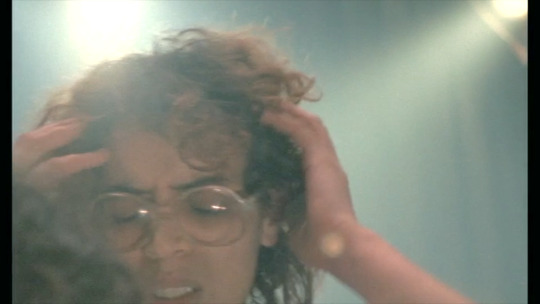
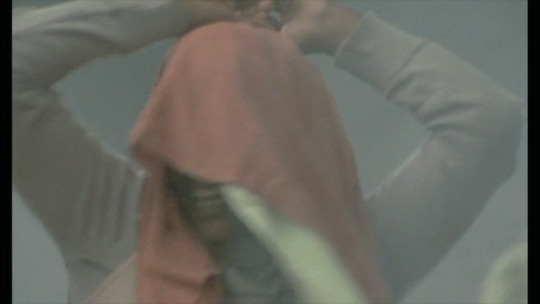

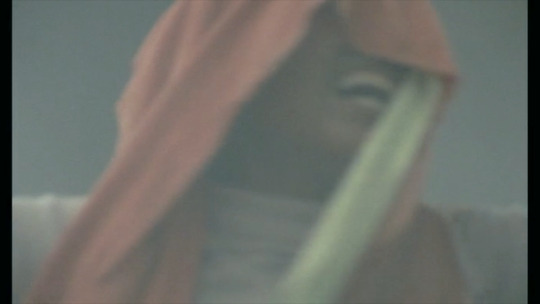
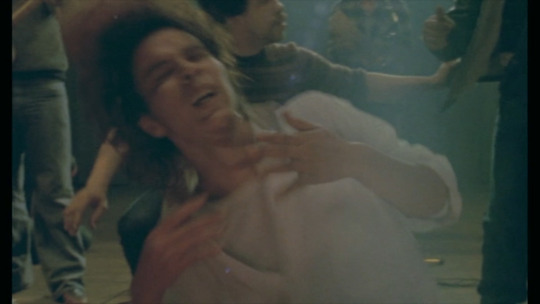
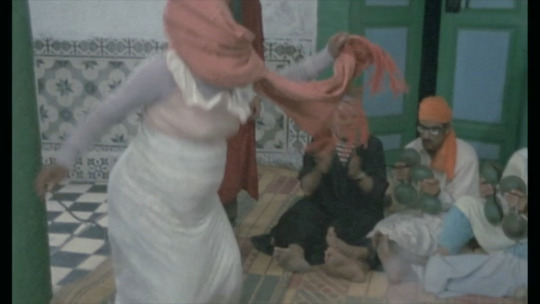

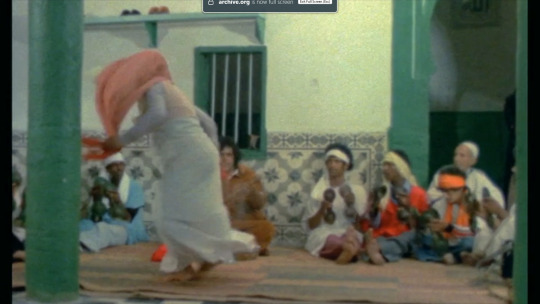
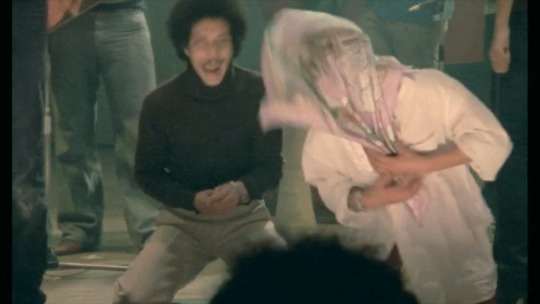

Trances also gives welcome insight into each member’s personality and role in the band. There is virtuosic banjo player Allal Yaâla, a quiet Black Moroccan with a mastery of Arabic, Berber, and occidental scales who taught the others much of their original repertoire. Tabla drummer and frequent lead singer Larbi Batma was their soul, a lanky, intense poet whose seriousness was offset by the sly humour of bendir (handheld frame drum) player Omar Sayed, the strongest actor of the troupe and perhaps its most gifted singer. The longest-running version of the band was rounded out by Abderrahmane "Paco" Kirouche on sintir (a sort of bass lute) and daadoua (a shoulder-held goblet drum), a robust man who’d been a woodcarver before finding musical success.
Nass El Ghiwane is an LP I appreciate more as I discover more of its context, knowing not only who these men are but how their talents fit together; some notion of where their music came from, and how audiences of their time received it. It benefits from being played as loudly as you’re comfortable with and being listened to in a meditative frame of mind. Nass El Ghiwane were “the Nass El Ghiwane of Morocco” just as they are the Nass El Ghiwane of Canada, Cambodia, and Fiji—but if a Scorsese quote comparing them to the Stones is what got me listening to them, I reckon that’s fair enough.
59/365
* Also, bless the Plein Soleil press release writers for bolding Mohammed V’s name, in case there were any real Alawi-dynasty heads out there in record-land. Worth noting they got the wrong king though, as it was actually Mohammed V’s son Hassan II who was in power during NEG’s heyday!
#nass el ghiwane#gnawa#trance#moroccan music#Ahmed El Maânouni#rai#music review#vinyl record#martin scorcese#'70s music#north africa
7 notes
·
View notes
Photo
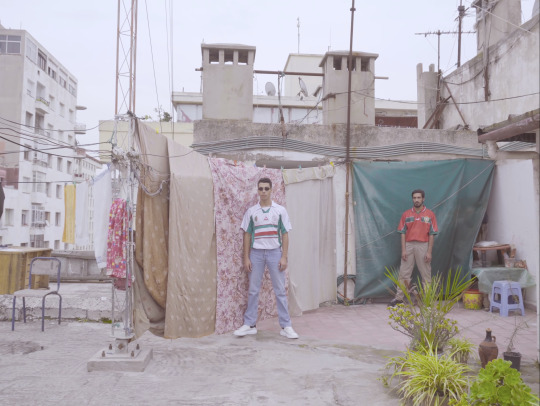


TRAP BELDI by ISSAM (2019)
Directed by ISSAM
#issam#issam music#north africa#maghreb#morocco#moroccan music#moroccan rap#fashion#algeria#rap#music#aestethic#art music
30 notes
·
View notes
Text

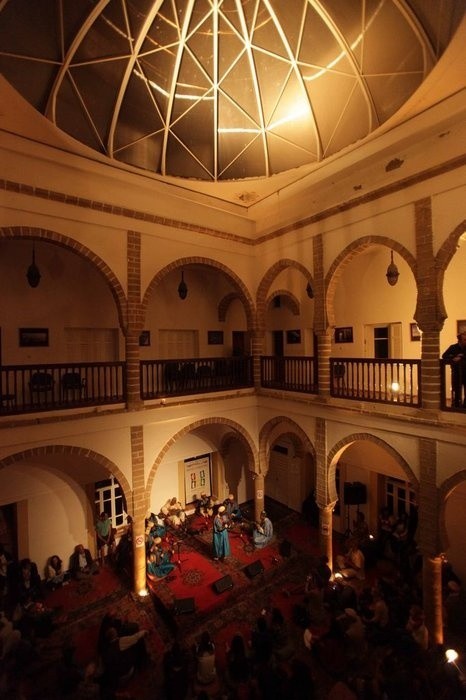
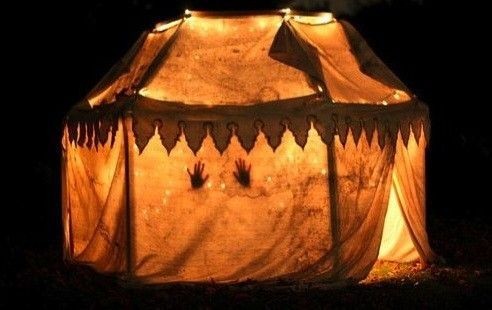
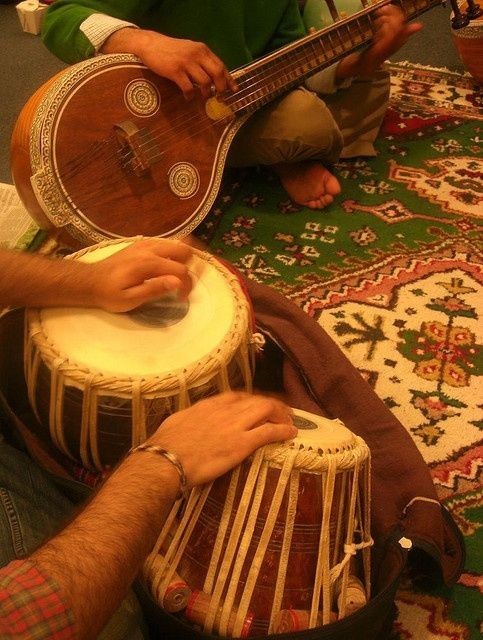
The Gnawa are a cultural and ethnic group often confused with the Imazighen (Berbers), as well as with Sufis. In fact, they are descended from slaves that were imported to Morocco from West Africa, who upon arriving, converted to Islam while maintaining aspects of their traditional spirit worship.
photos from Festival Gnaoua // text from SIMO LAGNAWI: LONDON'S TOP BERBER GNAWA
#gnawa#moroccan music#art aesthetic#culture#folklore#photography#parallels#festival gnaoua#essaouira#mogador#ancient traditions#web weaving#orange#artwork
13 notes
·
View notes
Link
@aloeverawrites
3 notes
·
View notes
Text
I'm used to be lost
I'm used to travel and be absent
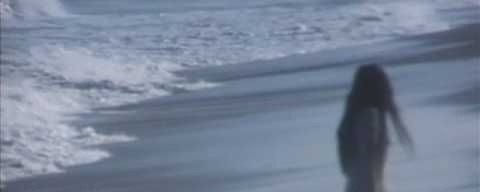
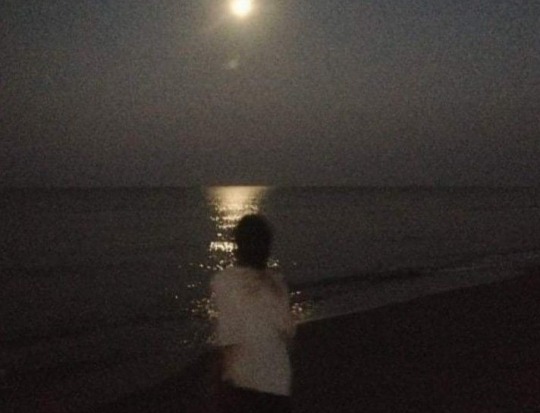
I'm sitting in front of the sea so that it doesn't leave 🎶
4 notes
·
View notes
Text
Shreya's voice 🖤🖤
1 note
·
View note
Text
ملي سمع با كبور لأغنية فينيتو 😁
1 note
·
View note
Text

Look at this perfect body, fag! This shows your place in the hierarchy. This King is at the top and you are way down, below any other men. You are not even a man. Worship this King! Bow your head and crawl over. Make sure you don’t make eye contact, you filthy whore! Begin to smell his bulge, his balls. Take his Mighty Arab Cock out and drain His balls. Do it you stupid cumslut!
#arab master#arab superiority#muslim supremacy#mnwo#muslim superiority#maître rebeu#rebeu#rebeu gay#rebeux#on your knees#arab supremacy#arabe#saudi arabia#arabic#arabmen#sexy arab#arab men#music#eurabia#maghreb#refugees#refugees welcome#alpha master#alpha man#alpha jock#morocco#moroccan#algerian#algeria#iraq
561 notes
·
View notes
Text
✒ The Worst Women
Prophet Muḥammad Sallallahu-ʿAlaihi Wa Sallam said:
“The worst women of yours are those who display their beauty to strangers (Mutabarrijat) and are arrogant, and they are hypocrites, NONE of them will enter Jannah EXCEPT the likes of red-legged crow (a rare bird) i.e only a few.”
● [سلسلة الأحاديث الصحيحة ١٨٤٩]
#islam#quote#allah#hijab#knowledge#inspirational quotes#islamicadvice#islam4 life#jilbab#la ilaha illa allah#islamicreminders#islamicart#islamic advice#islamicquotes#islamic#muslim revert#muslim reminder#muslimah#music#quran online#quran kareem#quranic#holy quran#quran ayah#quran#deenbot#deenislam#moroccan#morocco
20 notes
·
View notes
Text
me? obssessed with gnawa?
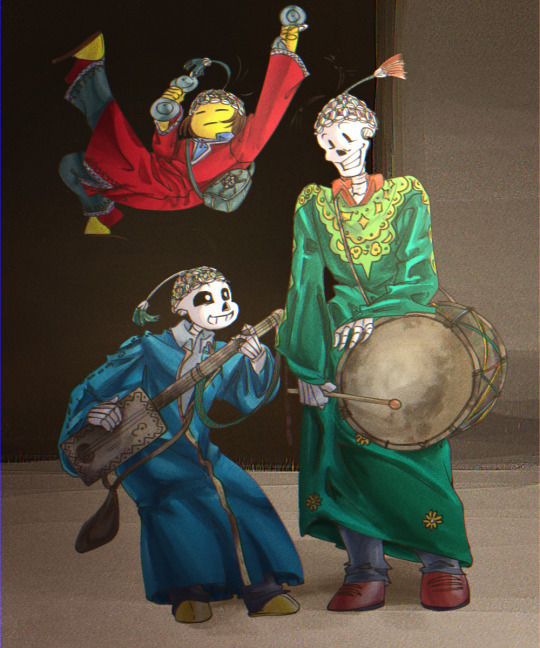
yes, yes I am b**ch
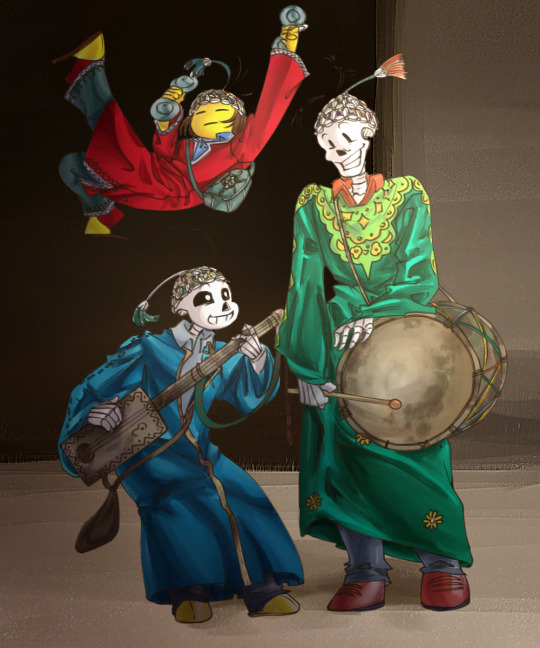
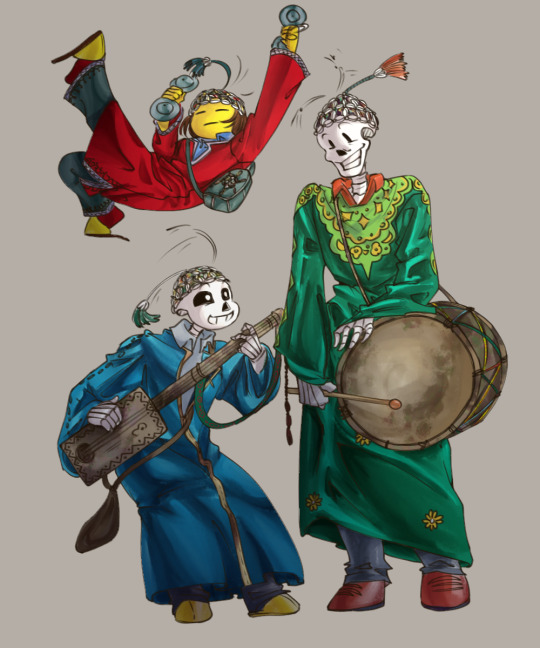
the sillies
#undertale#sans#frisk#papyrus#art#gnawa#gnawa music#moroccan stuff#north africa#Bc we love mother africa
100 notes
·
View notes
Text
Bisexual Swedish-Moroccan musician, Loreen explains why her song 'Euphoria' is a gay anthem.
95 notes
·
View notes
Photo
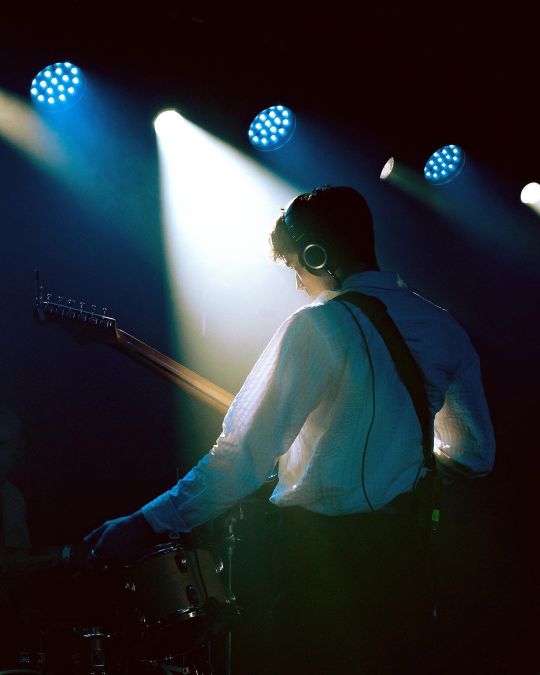

milk in LA ⚓️
ph. tallulahtotten
82 notes
·
View notes
Text
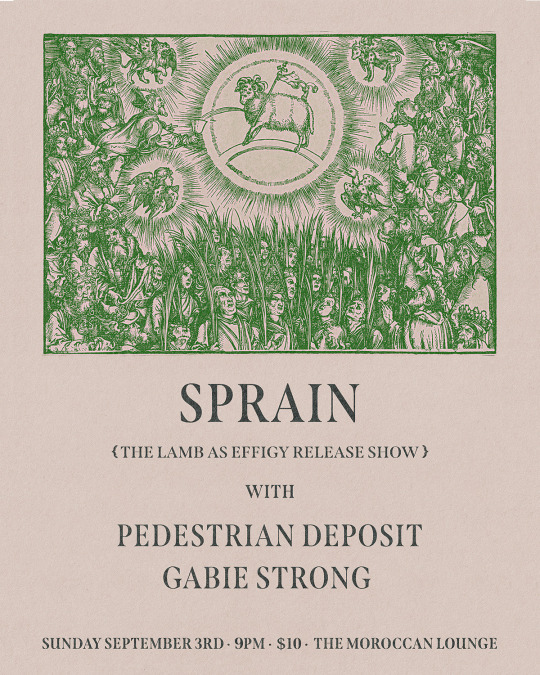
flyer by suzanne yeremyan
https://www.ticketmaster.com/sprain-los-angeles-california-09-03-2023/event/09005F0486362914
#occupation#live music#los angeles#essential#pedestrian deposit#sprain#gabie strong#moroccan lounge#the flenser
18 notes
·
View notes